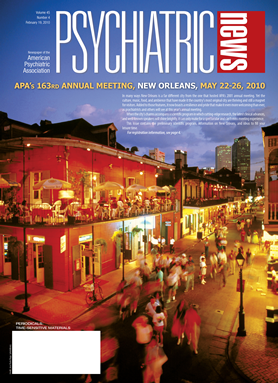A day-long course at the 2010 annual meeting in New Orleans will teach psychiatrists everything they need to know about buprenorphine as well as a general review of patient management of and treatment for opioid dependence.
The Drug Addiction Treatment Act of 2000 allows qualifying physicians to prescribe, dispense, and administer treatment for opioid dependence using medications designated Schedule III through Schedule V. Buprenorphine hydrochloride, either alone or in combination with naloxone, is currently the only pharmacotherapy approved for office-based treatment of opioid addiction.
Compared with methadone, a Schedule II medication that must be administered at methadone clinics, buprenorphine has a lower risk of diversion and overdose, Petros Levounis, M.D., director of this course, told Psychiatric News. “Based on our experience with buprenorphine so far, 95 percent of patients surveyed [in a recent study] felt buprenorphine was very or extremely helpful, and 60 percent were still in treatment after the first six months,” he said.
Because of its unique pharmacological properties, buprenorphine treatment can be given at a physician's office, and patients who have been stabilized can take home a 30-day supply of buprenorphine for long-term treatment. Thus, compared with methadone, buprenorphine offers patients a treatment option with a higher level of privacy and lessens the concerns of stigma. “Buprenorphine is the first-line treatment for opioid dependence in 2010,” said Levounis.
However, “there are still many patients who do better on methadone than on buprenorphine,” Levounis emphasized.
Although the course will focus on the pharmacology and therapeutics of buprenorphine, other treatment options for opioid dependence, including methadone, will be addressed. Even for psychiatrists who do not plan to prescribe buprenorphine immediately, the course can serve as a useful review on treatment of opioid dependence.
To provide office-based treatment for patients with opioid addiction, a physician must apply for a waiver from the Center for Substance Abuse Treatment (CSAT), an agency of the Substance Abuse and Mental Health Services Administration. Physicians who are granted the waiver receive a special identification number assigned by the Drug Enforcement Administration (DEA), which is necessary for prescribing buprenorphine. Physicians who do not specialize in addiction medicine or addiction psychiatry can qualify for the waiver after undergoing at least eight hours of training provided by professional organizations deemed acceptable by CSAT, including APA and the American Academy of Addiction Psychiatry.
The eight-hour course satisfies the legal requirement for buprenorphine prescribing. Psychiatrists who successfully complete the course will learn the steps from applying for the physician waiver, to registering with the DEA, and maintaining documentation to comply with federal regulations.
Among the course instructors, Levounis is director of the Addiction Institute of New York, chief of the Division of Addiction Psychiatry at St. Luke's and Roosevelt Hospitals, and an associate clinical professor of psychiatry at Columbia University. Additional course instructors include Andrew Saxon, M.D., a professor of psychiatry at the University of Washington and director of the Addictions Treatment Center at VA Puget Sound Health Care System; Laura McNicholas, M.D., an assistant professor of psychiatry at the University of Pennsylvania and the Philadelphia VA Medical Center; and John Renner, M.D., an associate professor of psychiatry at Boston University School of Medicine and associate chief of psychiatry for the VA Boston Healthcare System.
The course, “Office-Based Buprenorphine Treatment of Opioid-Dependent Patients,” will be held on Tuesday, May 25. The course fee is $270 for advance registration and $310 on site.

